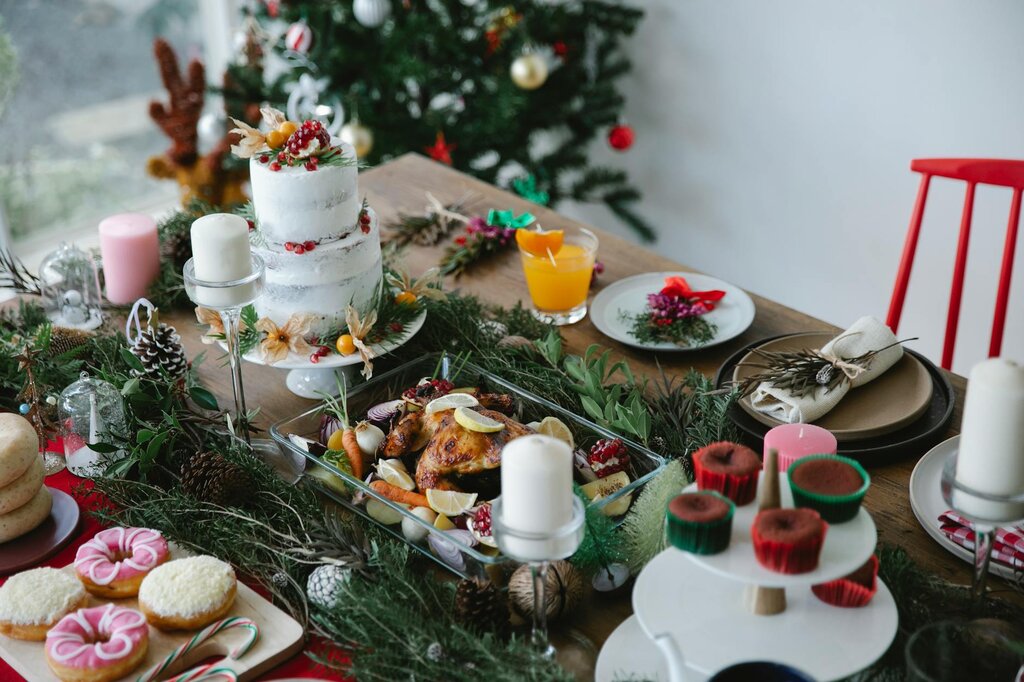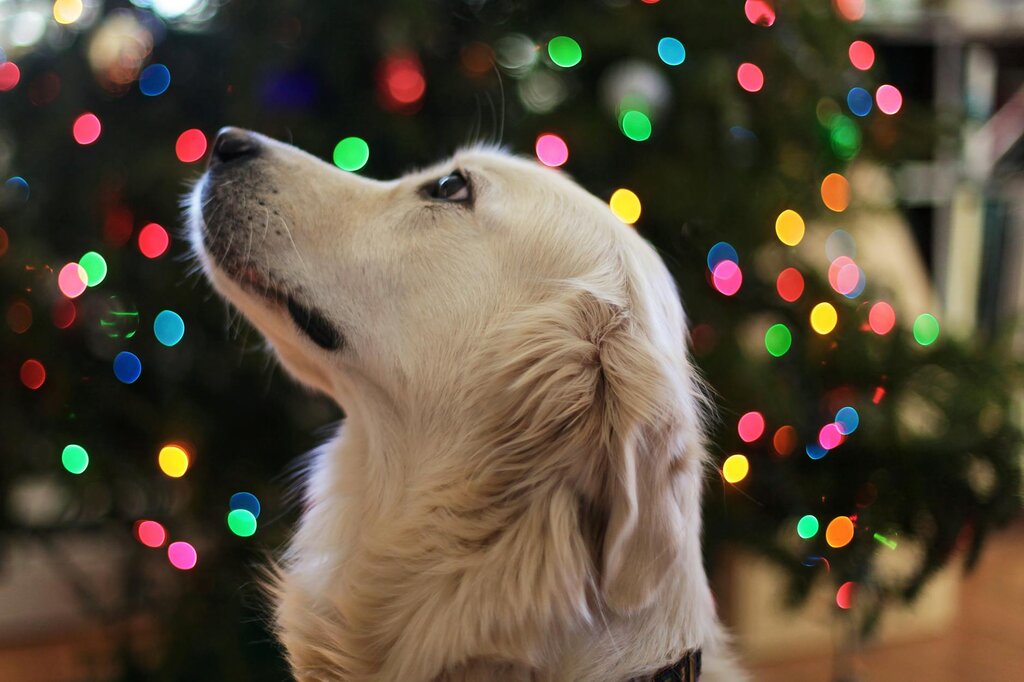Last Updated: 19/11/2025
Toxic Christmas Foods for Pets (and what to feed them instead)
Keep your pet safe this Christmas! Many festive foods like ham, fatty offcuts, macadamias, grapes, and chocolate are toxic to pets. Our vets list the common dangers, the risks (like pancreatitis), and offer great, safe treat alternatives for your dog or cat.
Author: Dr Carla Paszkowski BVSc (Hons)
Reading Time: 2 minutes - short read
'Tis the season to be jolly! With the festive season upon us, it's time to untangle the Christmas lights, get together with family, and eat an embarrassing amount of delicious food.
However, while you're clinking your champers and popping the Christmas crackers, it's important to be aware which delicious festive foods pose a danger to our furry friends. Read our guide below to common Christmas dangers, and see which treats are safe for pets!
In this article
The 'naughty list': Toxic Christmas foods to avoid

Mmm, Christmas food... Roast turkey, king prawns, ham off the bone, fruit cake, pavlova - is there anything more comforting? While you prepare your tastebuds for a comfort-food-extravaganza, it's important to remember that human food should only be eaten by humans. Some popular festive foods that should be kept well out of reach of your furry friend include:
Ham and fatty offcuts
Festive meats like ham, sausages, and fatty turkey offcuts are dangerously high in fat for dogs. A sudden fat overload can cause pancreatitis (a painful inflammation of the pancreas), one of the most common reasons pets are rushed to the vet at Christmas. This condition causes severe vomiting, nausea, and dehydration, and can cause life-long fat-sensitivity.
Macadamia nuts
Macadamia nuts, whether in cakes, chocolate, or on their own, are highly poisonous to dogs. While the exact toxin is unknown, ingestion can cause a wobbly gait, inability to stand, tremors, vomiting, and hyperthermia. Shells also pose a gastrointestinal foreign body risk. Keep these nuts well out of your dog's reach.
Grapes, sultanas and raisins
Often found on Christmas day within a fruit cake, fruit platter, or as part of a spiced meat sauce, grapes and their dehydrated versions can actually cause kidney failure in cats and dogs. The exact mechanism of this is unknown, so it is impossible to calculate a universal toxic dose. Best to keep them out of reach!
Read more about Pancreatitis in Dogs.
Onions and Garlic
If you'll be roasting some onion or garlic along with your Christmas turkey, best to also keep these away from your pets as they contain a toxin which can cause damage to your dog's red blood cells. If enough red blood cells are destroyed, your dog could become anaemic, lethargic and weak.
Chocolate
Chocolate is highly toxic to cats and dogs as it contains theobromine and caffeine, compounds they can't metabolise effectively. Dark chocolate is significantly more dangerous than milk chocolate. The risk level depends on your pet's weight, the type of chocolate, and the amount ingested. Signs of poisoning range from vomiting and diarrhoea to tremors, seizures, and coma.
Alcohol
Just like small children, cats and dogs are much more sensitive to alcohol than adult humans and can become poisoned very quickly. Alcohol is absorbed rapidly by the canine and feline body, and symptoms may include ataxia (walking wobbly), vomiting, decreased body temperature, loss of consciousness, or difficulty breathing.
Read more about Chocolate Toxicity in Dogs.

Lilies
While they're not a food, we thought we'd include Lilies in our list, as many people give and receive flowers around the holidays. Lily flower petals, pollen and leaves are extremely toxic to cats. The toxin found in Lily plants causes kidney failure. If possible, do not keep lilies in your house if you have a cat - it's just not worth the risk!
Read more about Kidney Disease in Pets.
The 'nice list': Safe Christmas treats for your pet

Not sure what treat to give your pet to keep them away from your Christmas lunch? Here are some of our favourites:
Festive treats
Just because the Christmas feast is for humans only, it doesn't mean your pet has to miss out! To help them feel part of the celebration (and keep them safely distracted from your plate), why not spoil them with a special festive treat made just for pets?
Treats to keep them occupied
Long-lasting "occupier" treats are perfect for keeping your dog busy and safely away from the Christmas lunch table. This prevents well-meaning family members from sharing dangerous scraps. Natural offcuts like those from Nature's Cuts (such as shark cartilage or pigs ears) are ideal. These sustainable, byproduct-based chews can provide hours of distraction.
For cats, try freezing broth or a lickable treat on a lick mat. Not only will this keep them occupied, it will also provide a refreshing, cool treat for a hot Australian Christmas.
Dental treats
Dental chews are a great Christmas gift that also help "brush" your pet's teeth. The mechanical action of chewing on the treat's surface helps to scrub away plaque and tartar.
Great options include Greenies for cats and the plant-based Whimzees for dogs. Whimzees are also an excellent low-fat choice. Instinctive Bite chews (available for both cats and dogs) are another great choice, being highly digestible with a fun, chewy texture.
Read more about dental care in our guides to Dental Care for Dogs and Dental Care for Cats.
Fruit and Veggies
Most fruit and vegetables are completely safe for pets, and offer a low calorie, low fat option for our furry friends. See below for a list of safe and dangerous fruit and vegetables for cats and dogs.
Safe
- Apple (no seeds)
- Banana
- Blueberry
- Carrots
- Celery
- Cucumber
- Green Beans
- Mango (seed removed)
- Melons (all varieties)
- Peach
- Pears (seed removed)
- Potato
- Pumpkin
- Strawberries
- Raspberries
- Zucchini
Unsafe
- Avocado
- Cherries
- Garlic
- Grapes
- Green potatoes
- Mushrooms
- Onions
Christmas is a wonderful time for the whole family, and by being aware of these common hazards, you can ensure it's a safe one for your furry members too. The simplest approach is to keep human food strictly for humans and to spoil your pet with their own special, pet-safe treat instead.
If you are ever in doubt or suspect your pet has eaten something toxic, it's crucial to contact your local or emergency vet immediately for advice.
Articles recommended for you
Our vet authored guide to the benefits of feeding your dog fresh food plus tips and advice for introducing it into their regular menu.
See our guide to protecting your pet from parasites from our vet team.
Thinking of getting a fish? Check out our guide for setting up a tank and home care tips!
Looking to understand horse feeds better? This comprehensive guide covers feeding recommendations for horses of all ages and disciplines.
Does your pet suffer from anxiety? Check out our Vet-guide for treatment options to help your pet.
History
Our experts continually monitor the health and wellness space and we update our articles when new information becomes available.
Wed 22 Oct 2025
Edited by Dr Gillian Hill BVSc (Hons)Dr Carla Paszkowski BVSc (Hons)
Veterinarian
Dr. Carla graduated from the University of Queensland in 2013 with a Bachelor of Veterinary Science and worked for a number of years in small animal clinics across South East Queensland. While Carla enjoys most facets of clinical veterinary work, she holds a special passion for feline medicine, pocket pets, and nutrition.

